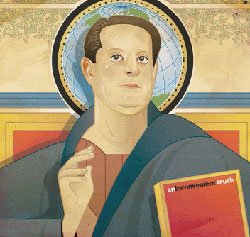Ross Douthat, in an argument with William Saletan, makes the point that Liberalism, aka Leftism, is merely the same Christianity we are all familiar with, modified into a materialist heresy with the scientific state at the center of the cosmos instead of Jehovah, no afterlife, and all the traditional teachings regarding celibacy and sex reversed.
[W]hen I look at your secular liberalism, I see a system of thought that looks rather like a Christian heresy, and not necessarily a particularly coherent one at that. In [his recent book] Bad Religion
, I describe heresy as a form of belief that tends to emphasize certain elements of the Christian synthesis while downgrading or dismissing other aspects of that whole. And it isn’t surprising that liberalism, which after all developed in a Christian civilization, does exactly that, drawing implicitly on the Christian intellectual inheritance to ground its liberty-equality-fraternity ideals.
Indeed, it’s completely obvious that absent the Christian faith, there would be no liberalism at all. No ideal of universal human rights without Jesus’ radical upending of social hierarchies (including his death alongside common criminals on the cross). No separation of church and state without the gospels’ “render unto Caesar†and St. Augustine’s two cities. No liberal confidence about the march of historical progress without the Judeo-Christian interpretation of history as an unfolding story rather than an endlessly repeating wheel.
And what’s more, to me, contemporary liberals’ obsession with the supposed backwardness of Christian sexual ethics—an obsession that far outstrips sex’s actual role in the preaching and practice of Christian faith—reflects a subconscious liberal knowledge that Christianity is their theological mother, and they’re its half-rebellious child. You can see in it the child’s characteristic desire to finally overthrow the last bastion of parental authority, joined to a continued desire for the parent’s approval for their choices and beliefs. …
[T]he more purely secular liberalism has become, the more it has spent down its Christian inheritance—the more its ideals seem to hang from what Christopher Hitchens’ Calvinist sparring partner Douglas Wilson has called intellectual “skyhooks,†suspended halfway between our earth and the heaven on which many liberals have long since given up. Say what you will about the prosperity gospel and the cult of the God Within and the other theologies I criticize in Bad Religion, but at least they have a metaphysically coherent picture of the universe to justify their claims. Whereas much of today’s liberalism expects me to respect its moral fervor even as it denies the revelation that once justified that fervor in the first place. It insists that it is a purely secular and scientific enterprise even as it grounds its politics in metaphysical claims. (You will not find the principle of absolute human equality in evolutionary theory, or universal human rights anywhere in physics.) It complains that Christian teachings on homosexuality do violence to gay people’s equal dignity—but if the world is just matter in motion, whence comes this dignity? What justifies and sustains it? Why should I grant it such intense, almost supernatural respect?
He’s perfectly right. What is modern environmentalism, after all, other than a particularly infuriating recrudescence of Dualism?






Donald Sensing
See my post of 2008, “Environmentalist religion explained.”
JKB
“Christianity, as a late writer has pointed out in words well chosen,* is the only system of socialism which commends it self as having a rational basis, and its founder the most practical teacher of it that the world has ever seen. ” The aim of all socialism is the securing of equality in the social condition of mankind, and if equality is to be secured at all it will be secured only by changing the hearts of men, and never by setting to work, in the first instance, upon the conditions.” But the present impulse of socialism is not Christian, but rather one willing to put an end to Christianity. And it is a system of machinery, like the kingdom of a tyrant, not of souls, like that of Christ. Now the Christian system did not rest on force at all. It was communistic, but not socialistic, as the word is properly used; for its very essence was the freedom of the individual will.
* Socialism and Legislation, Westminster Review, January, 1886.”
From ‘Ethics of Democracy’ Schribner’s Magazine 1886.
also we have this observation:
“The three great elements of modern civilization, Gun powder, Printing, and the Protestant religion.”
Thomas Carlyle
Maggie's Farm
Weds. morning links…
More on Lovelock’s recantation Students Sign Petition To ‘Redistribute’ GPAs, But Some Are Too ‘Greedy’ To Lower Their Grades For Others Progressivism as a Christian heresy Big Brother’s Next Target: Your Car Romney’s great-grandfather was a poly…
ThomasS
I agree Christianity is better than Socialism if you are merely comparing the two in regard to their most modern manifestation, but Christainity as a faith no more requires tolerance or forbids tyrants than Islam.
And, if anything, Christian claims to authority based upon revelation are even weaker than Socialist claims to scientific justification.
So if you have to choose one or the other, choose Christianity.
Fortunately today was have more choices.
Why the Liberals Hate Israel | The Conservative Papers
[…] was and is a competing religion to Christianity and Judaism. Liberalism is a Christian heresy a secular worldview that parasites off Judeo-Christian beliefs and imagery. It has its own […]
Never Yet Melted » Liberalism: Only a Christian Heresy | Divine Anarchy
[…] https://www.neveryetmelted.com/2012/04/23/liberalism-only-a-christian-heresy/ […]
Why the Liberals Hate Israel | PatriotsBillboard
[…] was and is a competing religion to Christianity and Judaism. Liberalism is a Christian heresy, a secular worldview that parasites off Judeo-Christian beliefs and imagery. It has its own creation […]
Towards a Christian Globalism (If Nationalism Fails) – Christian Talour
[…] fundamental institutions like hospitals, and the most basic assumptions about society like human rights, whether they represent some theological mutation or not, emerged from Christ’s Empire. In fact, […]
Please Leave a Comment!